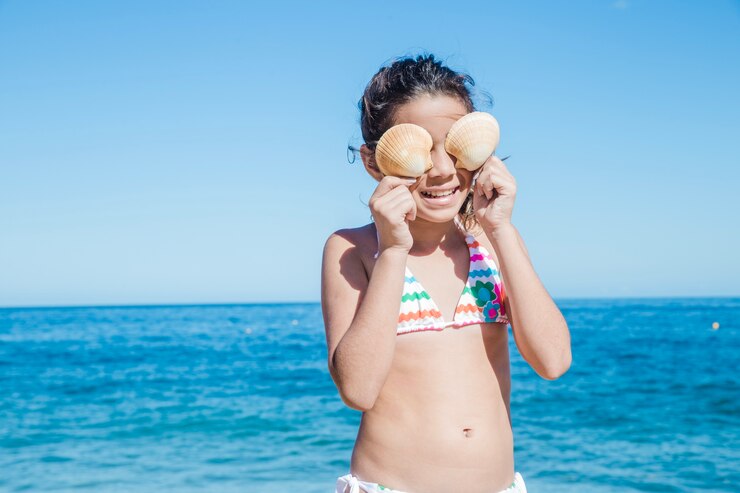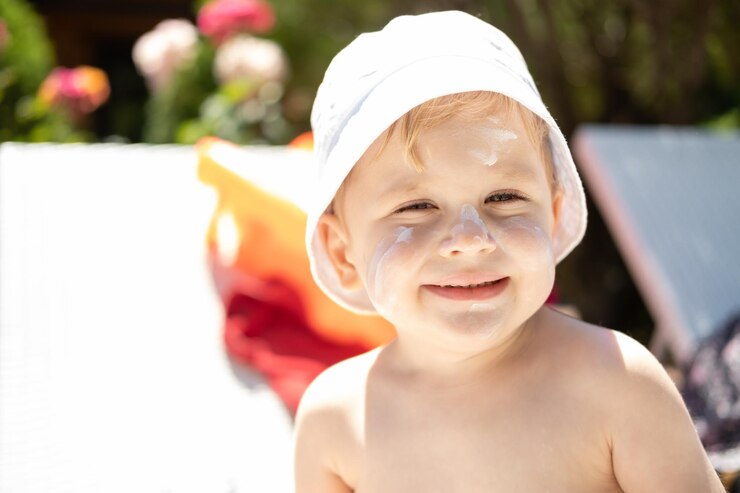Natural Baby Sunscreen Lotion : Ensuring the safety and health of your baby is every parent’s top priority, and that includes safeguarding their delicate skin from the sun. While the sun is a great source of Vitamin D, its ultraviolet (UV) rays can pose significant risks, especially to babies with sensitive skin. That’s where natural baby sunscreen lotions come into play, offering a safer and more effective way to shield your baby from harmful sun exposure.
In this detailed guide, we’ll explore why natural baby sunscreen is essential, what to look for in a sunscreen lotion, and how to choose the best product for your little one.
Table of Contents
Why Does Your Baby Need Natural Baby Sunscreen Lotion?
Babies have particularly sensitive skin, which makes them more prone to sunburn and skin damage than adults. The sun’s UV rays can not only cause sunburn but also contribute to long-term skin issues, including an increased risk of skin cancer later in life. Protecting your baby’s skin from the sun is crucial, and here’s why:
- Sensitive Skin: A baby’s skin is much thinner and more delicate than an adult’s, making it more vulnerable to sun damage.
- Risk of Long-term Damage: Early exposure to UV rays without protection can cause long-term skin issues and increase the likelihood of skin cancer.
- Sunburn Pain: Even mild sunburn can cause discomfort for your baby, leading to irritation and pain.

Why Choose Natural Baby Sunscreen?
Traditional sunscreens often contain synthetic chemicals like oxybenzone, octinoxate, and parabens, which can cause skin irritation or have potential health risks for babies. Natural baby sunscreen lotions, on the other hand, are formulated with mineral-based ingredients that form a protective layer on top of the skin, reflecting UV rays instead of allowing them to penetrate.
Advantages of Natural Baby Sunscreen
- Gentle on the Skin: Natural sunscreens use minerals such as zinc oxide or titanium dioxide to reflect UV rays. These are less likely to irritate a baby’s sensitive skin compared to chemical-based sunscreens.
- Hypoallergenic: These sunscreens are free from harsh chemicals, synthetic fragrances, and preservatives, reducing the risk of skin reactions.
- Eco-friendly: Many natural baby sunscreens are reef-safe, meaning they don’t contain chemicals harmful to marine life.
Important Ingredients in Natural Baby Sunscreen
When looking for the right natural sunscreen for your baby, the ingredients play a crucial role. Below are some essential ingredients that should be in a natural sunscreen:
1. Zinc Oxide
Zinc oxide is one of the most trusted and widely used minerals in natural sunscreens. It provides broad-spectrum protection against both UVA and UVB rays, acting as a physical shield. It does not penetrate the skin, making it a safe option for babies.
2. Titanium Dioxide
Titanium dioxide is another mineral commonly found in natural sunscreens. It works similarly to zinc oxide by blocking UV rays and is considered safe for sensitive skin, including babies.
3. Shea Butter
Shea butter is an excellent natural moisturizer that also has anti-inflammatory properties. It helps hydrate and soothe the skin, making it an ideal addition to baby sunscreen formulations.
4. Coconut Oil
Coconut oil acts as a natural emollient that locks moisture into the skin, offering additional protection against dryness and irritation.
5. Aloe Vera
Aloe vera is known for its calming and soothing properties. It is often included in baby sunscreens to cool the skin and alleviate any redness or irritation caused by sun exposure.
6. Jojoba Oil
Jojoba oil closely mimics the natural oils found in human skin, making it an effective moisturizer. It’s lightweight, non-greasy, and absorbs quickly, ensuring your baby’s skin remains soft and nourished.
Buy at AmazonIngredients to Avoid in Baby Sunscreens
While shopping for a natural sunscreen, it’s essential to steer clear of harmful chemicals that may affect your baby’s health. Here are some ingredients to avoid:
- Oxybenzone: A common sunscreen ingredient that may disrupt hormone balance and trigger allergic reactions.
- Octinoxate: This chemical absorbs UV rays but has been linked to potential endocrine disruption.
- Parabens: Often used as preservatives, parabens can mimic estrogen and may contribute to hormone-related issues.
- Synthetic Fragrances: Fragrances can irritate sensitive skin and trigger allergic responses.
- Retinyl Palmitate: A form of Vitamin A that can increase skin sensitivity when exposed to the sun.
How and When to Use Natural Baby Sunscreen Lotion
Knowing how and when to apply sunscreen is just as important as choosing the right product. Here’s a step-by-step guide to ensure your baby is adequately protected:
1. Apply Before Sun Exposure
It’s essential to apply sunscreen at least 20 to 30 minutes before your baby is exposed to the sun. This gives the product enough time to create a protective barrier on the skin. Remember to reapply sunscreen every two hours, especially if your baby has been swimming or sweating.
2. Cover All Exposed Areas
Don’t skimp on sunscreen! Be sure to cover all exposed areas of your baby’s skin, including the face, neck, hands, feet, and behind the ears. Don’t forget often overlooked spots like the back of the neck or the tops of the feet.
3. Age Considerations
For babies under six months, it’s generally recommended to keep them out of direct sunlight rather than relying solely on sunscreen. If you must use sunscreen, ensure it’s formulated specifically for infants and use it sparingly.
Other Sun Protection Measures
While sunscreen is a vital part of sun protection, it shouldn’t be the only method you rely on. Here are a few additional steps you can take to protect your baby from the sun:
1. Stay in the Shade
Avoid exposing your baby to direct sunlight, particularly during peak hours from 10 AM to 4 PM. Opt for shaded areas and use items like umbrellas, canopies, or wide-brimmed hats to shield your baby.
2. Dress Properly
Choose lightweight, long-sleeved clothing with a UPF rating to protect your baby’s skin. Light-colored clothing is preferable as it reflects sunlight better.
3. Keep Your Baby Hydrated
Babies can become dehydrated quickly in the heat, so it’s essential to keep them well-hydrated. For infants under six months, ensure regular breastfeeding or formula feeding. Older babies should be offered water frequently.
Buy at AmazonChoosing the Best Natural Baby Sunscreen
When selecting a natural baby sunscreen, consider the following factors:
- Broad-Spectrum Protection: Ensure the sunscreen offers protection against both UVA and UVB rays.
- SPF Rating: Opt for sunscreens with an SPF of at least 30 for effective protection.
- Water-Resistance: If your baby will be swimming or playing in water, choose a sunscreen that is water-resistant.
- Non-Nano Ingredients: Choose sunscreens with non-nano particles of zinc oxide or titanium dioxide to minimize the risk of particle absorption.
Top Recommended Natural Baby Sunscreen Brands
Here are some of the top brands that offer safe and effective natural baby sunscreens:
- Earth Mama Baby Mineral Sunscreen: This sunscreen combines zinc oxide with nourishing ingredients like shea butter and coconut oil for excellent sun protection and hydration.
- Badger Baby Sunscreen Cream: Formulated with non-nano zinc oxide and soothing ingredients like calendula and chamomile, this sunscreen is a top choice for sensitive skin.
- Thinkbaby Safe Sunscreen: Offering SPF 50 protection, this product uses a mineral-based formula with soothing aloe vera and hydrating jojoba oil.

Conclusion: Prioritize Your Baby’s Sun Safety with Natural Sunscreen
Natural baby sunscreen lotions are the ideal choice for protecting your little one from harmful UV rays while ensuring their skin remains soft, hydrated, and irritation-free. With mineral-based ingredients like zinc oxide and titanium dioxide, you can be confident that your baby’s skin is getting the best possible protection without exposure to harmful chemicals.
Being proactive with sun protection and choosing the right sunscreen can help prevent long-term skin damage and ensure your baby enjoys safe, happy outdoor adventures.
Read Also: PriceReviews
- Best Baby Diapers in India: The Ultimate Guide for New Parents in 2024
- Best Baby Skin Care Products in India: Products for Your Baby’s Delicate Skin
- The Best Adult Diaper Rash Creams in India – Your Ultimate Guide to Comfort and Relief!
- Perfect Baby Carrier Bag for 4 to 24 Months India : Your Hands-Free Parenting Solution in India
